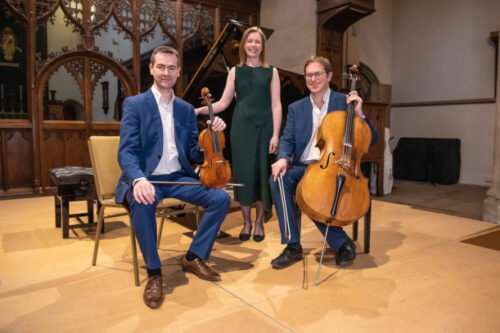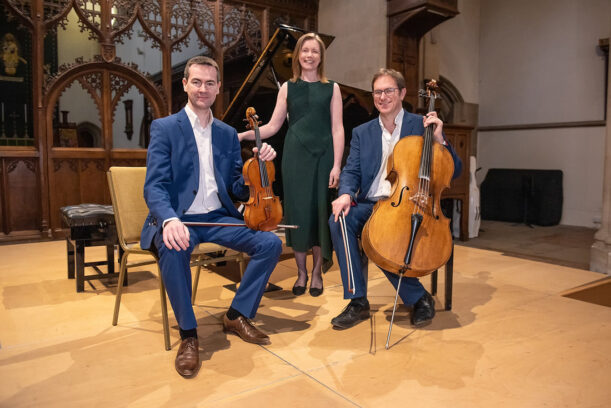 United Kingdom Moeran, Debussy, Schubert: Fidelio Trio (Darragh Morgan [violin], Tim Gill [cello], Mary Dullea [piano]). Turner Sims, Southampton, 9.3.2023. (CK)
United Kingdom Moeran, Debussy, Schubert: Fidelio Trio (Darragh Morgan [violin], Tim Gill [cello], Mary Dullea [piano]). Turner Sims, Southampton, 9.3.2023. (CK)

Ernest Moeran – Piano Trio in D
Debussy arr. Sally Beamish – La Mer
Schubert – Piano Trio in E flat No.2, D929
Many moons ago, a music teacher friend told me that whilst riffling through a stack of old sheet music in a second-hand shop he had come across an arrangement of Tchaikovsky’s 1812 Overture for solo viola. This bizarre memory was triggered by the prospect of hearing the Fidelio Trio perform Debussy’s La Mer as part of their programme at the Turner Sims last Thursday. La Mer? For piano trio? More on that anon.
The Fidelio Trio have strong ties with Ireland, and throughout their existence they have been admirable champions of Ernest Moeran, whose music, they say, ‘has been part of our DNA for many years, long before we played a note of it.’ I am probably not alone in knowing nothing of Moeran beyond a substantial symphony (eclipsed, permanently it seems, by Walton’s contemporaneous First Symphony) and a handful of shorter pieces such as Whythorne’s Shadow. His early Piano Trio in D proved to be a delightful surprise: with the opening cello phrase, supple and sonorous, we were caught up in a natural flow of sound that never rushes and never stagnates, hinting at times at English Pastoral (Cotswold Rapture or Cowpat Music, depending on your point of view), or folk music; while the piano’s unbroken rippling and chiming claimed unmistakable kinship with Debussy and Ravel.
The Trio is in the conventional four movements, but it is not music that invites analysis, certainly not from a layman such as me. I remember the first time I heard Tippett’s Triple Concerto the music put me in mind of Caliban’s words in The Tempest – the isle is full of noises, sounds and sweet airs that give delight and hurt not – and I was absurdly pleased to discover that this speech had been in Tippett’s mind too. I think Moeran’s Trio casts a similar spell, and this is how I prefer to listen to it.
There is a good story of Sir Thomas Beecham and a companion whiling away a long trans-European train journey by seeing how many notes they could remove from the score of Richard Strauss’s Ein Heldenleben whilst leaving the piece essentially intact. By the time they reached their destination they had reached 15,000. Debussy’s lithe and scintillating orchestration of La Mer carries no such excess fat; but when Sally Beamish, composer and violist (has she played the 1812, I wonder?) was asked to arrange the piece for piano trio she wisely chose not to transcribe it, which would have kept all three players unrelievedly busy, but to distil it, using all the tricks the players are capable of (sul ponticello, violin harmonics etc).
Less wisely, I listened to Claudio Abbado’s Lucerne performance (which fields 16 cellos to the one we heard) before the concert: so while enjoying the ingenuity of Beamish’s arrangement (the lion’s share of the harmonic movement inevitably entrusted to the piano) it was hard not to hear, as it were, the orchestral version alongside; and even to consider the question ‘Arrange it? Why?’ Strange to say, the performance suffered a little from following on the heels of the Moeran where the flow seemed more natural. That said, there were some wonderful things: the quiet ebb of the second movement – Jeux de vagues – was truly magical.
After the interval, substantial fare: Schubert’s E flat Piano Trio, one of two that he completed near the end of his brief life. In the old (1957) Penguin book on chamber music, William Mann devotes four closely-written pages to the B flat Trio before dismissing the E flat Trio in a single paragraph as ‘longer, more thorough-going, less endearing than its predecessor’. Certainly it is more sombre than its fellow, despite its richness. In the large-scale first movement Schubert unusually chooses the secondary theme – little more than a gently poignant sigh – for extended development; and the lovely cello tune that ushers in the Andante con moto (reputedly a version of a Swedish folk-song, See, the sun is sinking) has a sinister piano accompaniment that aligns it, perhaps, with those ghostly marches in some of Mahler’s Wunderhorn songs. The movement’s passionate climax is unmistakably tinged with anguish, its bleak conclusion peters out, comfortless. We may be reminded, as we never are in the B-flat Trio, that Schubert was working on Winterreise at around the same time.
All this we heard in the Fidelio Trio’s eloquent performance. Mary Dullea’s playing of the commanding piano part in the first movement, with its recollections of the G major Piano Sonata D894 and the A flat Impromptu D899, stays in the memory.
In the Scherzo Schubert inverts our expectations by having the main material – light-footed, rather mechanical, much of it in canon – gate-crashed by a galumphing waltz of a Trio: Mary Dullea’s stentorian piano made sure that it really was a crash. The finale has been almost universally considered too long; but it provided ample opportunity to enjoy the interplay between these sensitive musicians – Darragh Morgan (violin), Tim Gill (cello) and Mary Dullea. Spookily effective, in their hands, were the passages where each instrument in turn plays the theme as a hushed vibration (like the strumming of a mandolin, some say, though they make me think of moths).
Listening to a lengthy Schubert movement is hardly a hardship. These fine players aptly concluded their own commentary on the work with a typically puckish remark about Schubert attributed to Stravinsky: ‘What does it matter if, on hearing these works, I doze off now and then, so long as, on awakening, I always find myself in Paradise?’
This unusual and stimulating programme, performed by outstanding musicians, was enjoyed by an audience of a hundred or so. If you are reading this, and you live within range of Southampton, may I encourage you to give the Turner Sims a try? It may not have the architectural distinction of St George’s Bristol, but its fine acoustic and friendly atmosphere make it a marvellous place to meet people and listen to music – classical, jazz and on to the furthest musical frontiers you can think of. I hope to see you there.
Chris Kettle
